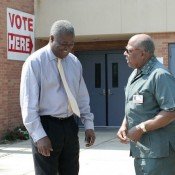A June 15 event billed as a huge show of unity for Mayor-elect Harvey Johnson Jr. turned into a debate over transparency after organizers barred photographers and electronic media from the event held at the University Club downtown.
Walter Zinn, Johnson's campaign coordinator, said organizerswhich included business leaders like author James Covington and Center for Social Entrepreneurship founder Bill Cooleyvoted to bar the use of cameras because of the reception's designation as a private fundraiser. Both Zinn and Covington said it was a mistake that the media, who were invited by several hosts and organizers, were not forewarned that cameras would be barred.
Johnson himself called the Jackson Free Press Tuesday about the mix-up over transparency. "We screwed up," he said, adding that it was the decision of the organizers, and "we were pulled into the mess."
Covington said Tuesday that he wished cameras had been allowed in to better document the positive nature of the event. "It was shortsighted. Granted," he said. The organizers, he said, had the "right" to close the event, which likely raised thousands of dollars to retire Johnson's campaign debate.
Johnson would not divulge Tuesday how much debt he has, or how much was raised at the event, saying he was not legally required to report the figures, yet. During the campaign, Johnson vowed to return transparency to city government, including lessening the time the public has to wait for public information.
Despite the controversy over transparency, organizers called the reception a success, pointing out that a variety of people attended, including supporters of Johnson's political opponent Marshand Crisler, and people working under former Mayor Frank Melton.
Noticeably absent were businessman Leland Speed and Hinds County Sheriff Malcolm McMillin, who supported Crisler. Downtown Jackson Partners President Ben Allen said Speed was "at the function in spirit" but out of state at the time of the event.
Jackson developer David Watkins, who is overseeing renovation of the King Edward Hotel, Standard Life Building and the Farish Street Entertainment District, said voters had "chosen to put our city back on track," and called for unity under the new mayor.
Dr. David Powe, associate vice chancellor for administrative affairs at the University of Mississippi Medical Center, called on local universities and colleges to do their part in "helping move the city forward." Powe did not say if UMMC would consider re-instituting an annual $200,000 payment to the city devised under Johnson's last administration. Melton canceled the grant in 2005.
Allen called on business leaders to deal with the new administration out of the public eye. "Families have disagreements, and families that are smart have disagreements with decorum, with stability, and they don't do it in the newspaper. I pledge on behalf of Downtown Jackson Partnersand I hope that everyone in here will pledge as wellthat you will not be the bait for the press."
"I love the press," he added caustically.
Johnson divulged few changes he intends, but marked poverty as the city's top issue.
"One out of every four persons in our city is at or below poverty level. It's going to be difficult to talk about crime, about education, and affordable housing until you do something about poverty," Johnson said.
He then revealed his intention to push businesses seeking tax abatements and contracts with the city to hire Jacksonians. Johnson said any working solution would require the participation of people who don't know the exclusive University Club exists: ӑTogether' means that we have to make sure that the least of us is considered in any and every equation for progress.



Comments
Use the comment form below to begin a discussion about this content.